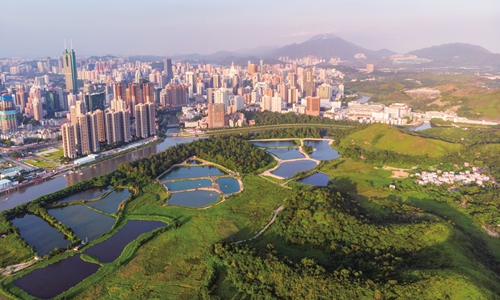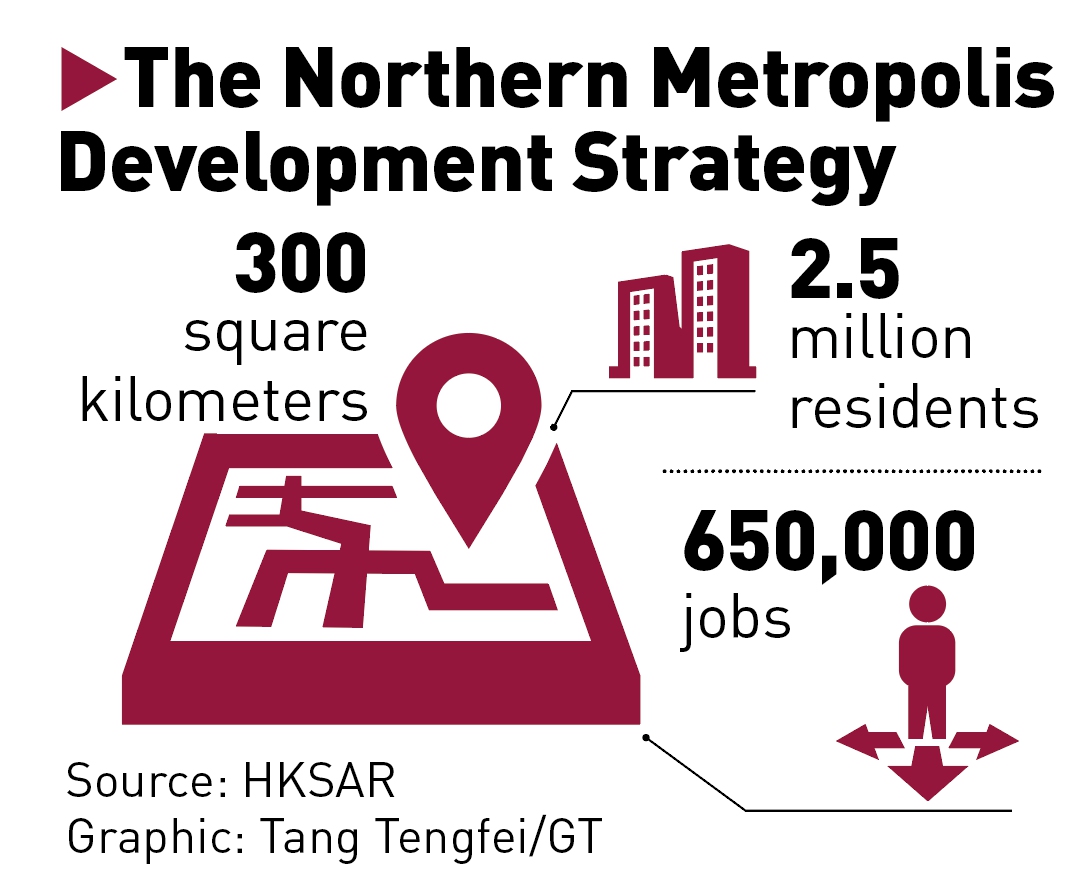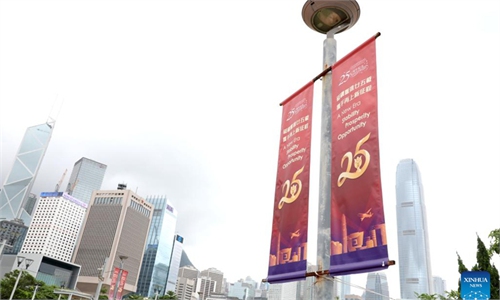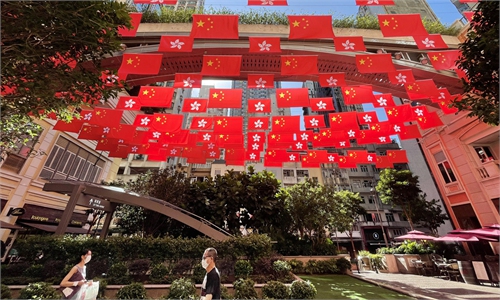
A rural part of Hong Kong SAR next to Luohu, Shenzhen in South China's Guangdong Photo: VCG
The Hong Kong Special Administrative Region (HKSAR) has plans to build a new district in its northern region to increase housing supply, especially for young people. The area will be developed into a tech hub, aimed at accelerating economic recovery and creating new growth momentums for the city.
Housing woes have plagued Hong Kong for many years, each government had worked hard to solve this problem, John Lee Ka-chiu, the Chief Executive of HKSAR, told the press on Tuesday.
"I will go all out to solve this problem with my team. But I am also pragmatic in knowing that there are many deep issues involved in housing issues, many of which take a long time to resolve due to procedural, legal or practical circumstances," Lee noted.
What is the nature of Hong Kong's housing problem? Is there a solution to a problem that has plagued the city for years? This is a topic that cannot be avoided every time people talk about Hong Kong's social problems.
Analysts have pointed out that now is an opportune time for Hong Kong to solve an array of social and economic problems, given the accelerated integration of the Guangdong-Hong Kong-Macao Greater Bay Area (GBA), combined with an increasingly volatile global landscape.
Hong Kong had a population of 7.4 million as of the end of 2021, of which 57.1 percent were aged between 20 and 59, according to statistics from the Census and Statistics Department of HKSAR.
The current urban area of Hong Kong is small, just over 200 square kilometers, which is equivalent to 20 percent of the urban area of Shenzhen. Seven million people live in a confined urban area in Hong Kong, which is indeed very crowded, and also forces Hong Kong's young people into smaller and smaller houses, a veteran industry insider surnamed Wang who has lived in Hong Kong for 15 years, told the Global Times.
Root cause
Now is the right time to tackle the housing problem and that Hong Kong must "reinvent itself" through aggressive measures after the "perfect storm" of the past few years, Wendy Hong Wen, member of the Election Committee Constituency of the HKSAR, told the Global Times in an exclusive interview.
"In the Legislative Council, I have set myself two goals. One is to promote the settlement of the land and housing issue. The other is to promote the diversification of Hong Kong's economic structure and create diversified development opportunities for everyone to participate in," said Hong.
Hong also talked about the difficulties in property development in Hong Kong, such as complicated process that could last at least seven years, and potentially up to a decade.
"Over the years, Hong Kong has become increasingly bloated with regulations. For example, the Town Planning Ordinance requires public consultation at every stage. When the public raises questions or objections, departments have to deal with them before moving on to the next step. We thought it was very democratic, that public participation was a very advanced concept, but when it got to a point where society was tearing apart and people were voting against everything, there was no way to go down," Hong said.
She also said that coordination between various government departments has slowed down the land supply in Hong Kong.
"Is Hong Kong's housing problem all about houses? In fact, it reflects the deep-seated contradictions that the whole society faces when it solidifies to a stage. We say that the economic base determines the superstructure. Was the social unrest three years ago a purely political issue? In fact, it is the total outbreak of intertwined contradictions. Because many people have no sense of gain in life here, and even have a sense of 'deprivation,' they need to find various channels to vent their dissatisfaction," said Hong.
She noted that in Hong Kong today, housing is not the end of the story. Young people in Hong Kong, apart from being given an apartment, also need to have the opportunity to "move up" and realize their self-worth. However, housing is an unavoidable topic in any case.

Wendy Hong Wen, member of the Election Committee Constituency of the HKSAR Photo: Fan Lingzhi/GT
Solutions
The government of HKSAR has put forward the Northern Metropolis Development Strategy in the 2021 Policy Address in October, 2021. The Northern Metropolis will help enhance cooperation between Hong Kong and adjacent Shenzhen in South China's Guangdong Province and therefore facilitate Hong Kong's integration into the overall development of the country.
With an area of 300 square kilometers, the proposed metropolis covers from the west to the east the Shenzhen-Hong Kong Boundary Control Points Economic Belt, as well as deeper hinterlands, according to the policy address.
"I think land reclamation from sea-filling is not the only way, and even the need for it is worth discussing. If we can really develop the Northern Metropolis area well, the land problem in Hong Kong will be solved to a large extent. The Northern Metropolis covers about 300 square kilometers, about one third of the total area of Hong Kong," said Hong.
Hong Kong used to be a very intensive development, leaving more than 70 percent of the land undeveloped.
"Although some of the 70 percent land cannot be developed for multiple reasons, we still have a lot of room to do, especially the residential land accounted for only about 7 percent in Hong Kong, which is a very, very small amount. Hong Kong has land, and reclamation is not the only way to solve the problem," Hong said.
Wang, the veteran industry insider, also said that the 300-square-kilometer new area can house 2.5 million people.
"This means that Hong Kong will be a city with a population of 10 million people. Hong Kong's young people will not have to worry about expensive houses in the future. Hong Kong's enterprises will have land to build factories, and Hong Kong's vitality will be reinvigorated," Wang said.
The Northern Metropolis will be developed as an international IT hub with unique metropolitan landscape. The number of jobs in the new area will increase from 116,000 to about 650,000, including 150,000 innovation and technology industry-related jobs, said the HKSAR government.
Some industry insiders said that the Northern Metropolis can be Pudong of Hong Kong. Pudong, a new area on the east bank of Shanghai's Huangpu River, is an ultra-modern commercial center filled with high-rises, including several of the world's tallest buildings.
"Hong Kong's development has always been focused in the southern part, while the northern area adjacent to Shenzhen has always been the border villages. The development of this northern new area in Hong Kong will enable Shenzhen and Hong Kong to develop their urban area together and become the home ground of the GBA, which is no less significant than the development of Pudong New Area in Shanghai," said Wang.

Graphic: Tang Tengfei/GT



